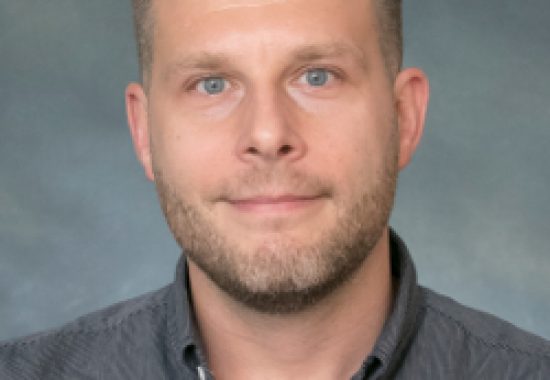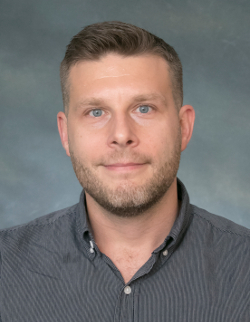Edward Wlotko, PhD, has been studying how the brain processes language since he was an undergraduate at the University of Pittsburgh. And his interest in language comprehension—particularly how the two hemispheres interact to make that happen—deepened in graduate school, at the University of Illinois at Urbana-Champaign. There, he devoted his dissertation work to understanding the differences in how language is processed by each hemisphere of the brain, the two sides working separately and in tandem.
Before coming to Moss Rehabilitation Research Institute, Dr. Wlotko completed two post-docs, one at the Beckman Institute for Advanced Science and Technology at the University of Illinois, the other at Tufts University.
“In my first post-doc,” says Wlotko, “I studied language in the aging brain. At Tufts, I used neuroimaging to study college-aged adults’ language comprehension. So when I got to MRRI I wanted to combine and extend these areas of research from my past work.”
Now, as director of the MRRI Cognitive Neurophysiology and Neuropsychology Lab, Wlotko is trying to further understand how language works in healthy brains to ultimately help problems with language caused by stroke. For example, mapping what facets of language comprehension and production are governed by the two sides of the brain will provide clues to the kind of language or communication difficulties someone might experience after a left vs a right hemisphere stroke. Wlotko believes it is important to approach this question from both angles: Learning about the healthy brain helps researchers understand what happens in the damaged brain—and learning about what’s going on during stroke helps researchers understand more about the healthy brain.
One of Wlotko’s focus areas is how the left and right hemispheres use context differently during normal language comprehension. The two sides serve fundamentally distinct purposes in language comprehension, but both are necessary. “The main project I’m getting up and running here at Moss is continuing to look at hemispheric differences,” says Wlotko. “The left hemisphere is good at using context predictively – knowing what’s coming next. The right hemisphere doesn’t anticipate what’s coming in that way. It doesn’t care about predictability in the same way, but it has an advantage when it comes to information that’s not predictable, but is nevertheless related and relevant.”
Additionally, he and his team have noticed that not everyone’s brain ages in the same way. “For older individuals who show more age-related change relative to young adults,” says Wlotko, “their brains show similarities with right hemisphere of young adults. But in those who retain younger looking brains, theirs look more like the left hemisphere in young adults.”
To explore how the brain processes language, Wlotko measures the brain’s electrical activity through what are known as event-related potentials (ERPs)—small jumps in electrical activity when the brain takes in information, which can be measured through a number of electrodes placed around the scalp. For example, the brain reacts differently when a stimulus (e.g., a word in a sentence) is predictable, vs. unpredictable. Looking at ERPs, one can compare how the brain processes language in healthy individuals to those who have experienced stroke.
“Here at MRRI,” says Wlotko, “I am using these kinds of experiments to compare language comprehension after left vs. right hemisphere stroke at the group level. But we also hope that this is going to let us learn more about how individual patients differ, which can provide a lot of clues for rehab.”
Wlotko plans to continue working with both healthy and stroke-affected people, and particularly with people of all ages, instead of only young adults, who are the usual participants in this kind of research. “I’m also planning on doing more work in healthy individuals, who haven’t experienced stroke, but who are of different ages. Most of what we know about language comes from college-age samples – not the people who are likely to have a stroke. Since there are age-related changes across the lifespan, we need to see these changes to understand differences between healthy aging and stroke.”
Wlotko looks forward to his burgeoning career at MRRI, and to collaborating with other researchers. Using research to turn theory into therapy is one of the fundamental aims at MRRI, and Wlotko is on board for the challenge.
“I was drawn to MRRI not only because of the strong reputation for theoretically motivated research that simultaneously drives forward our understanding of the brain as well as creates insights for rehabilitation,” says Wlotko, “but also because the resources available at the Institute allow me to add a neuropsychological approach to my research that would be very difficult to do anywhere else. I look forward to further enhancing our understanding of how the two hemispheres of the brain work together.”


